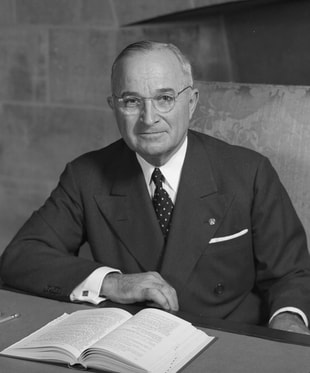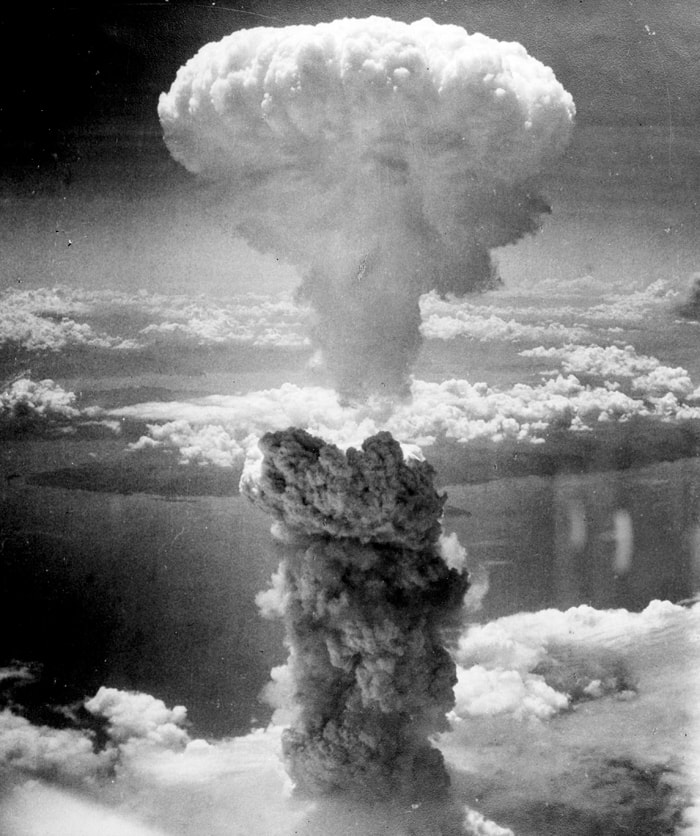HARRY S TRUMAN
|
Harry S Truman was born in Missouri in 1884. He spent much of his childhood on a farm. Truman graduated from high school and worked on the railways. Later, Truman served in the army and fought during World War I. After returning home, he opened a haberdashery shop with his wife. Unfortunately, the store went bankrupt and Truman sought an alternative profession. He became interested in politics and joined the Democratic Party. Truman was elected as County Court Judge in 1922. Truman’s political interests continued, and he made his way up the ranks.
In 1934 Truman ran for congress, and in the 1940s was successful. With time, Truman continued to gain political popularity and in 1945 Truman was elected as Vice President. However, soon after he became vice president, 82 days to be exact, when Franklin D. Roosevelt died. At the time, the United States was in the end stages of World War II against Nazi Germany in the European Theater and Imperial Japan in the Pacific Theater. With the death of Roosevelt, Truman was appointed president and became the 33rd President of the United States.
|
Although World War II was nearly over when Truman became president, he played a significant role in the history of the war and the decades that followed. First, he participated in the Potsdam Conference which occurred from July 17th to August 2nd in 1945 and was a wartime meeting of the Allied leaders, including: Truman, Winston Churchill and Joseph Stalin. The meeting took place in Potsdam, which at the time was in the Allied controlled area of Germany. The purpose of the conference was for the three Allied powers to begin discussing how to handle the defeat of Nazi Germany, which had occurred just recently. Other goals focused on how the world would carry on after the war. While, World War II in the Pacific was not over yet, the Allies could see that the end of the war was near and that Japan would soon be defeated.
It is at the Potsdam Conference that Truman made Stalin aware of the American atomic weapons program (Manhattan Project) and that the Americans had developed the world's first atomic bomb. It was also at this conference that a deep divide was created between the United States and the Soviet Union. Truman was incredibly suspicious of Stalin and his intentions and Stalin felt a similar way towards Truman. In general terms, the seeds of the Cold War were planted at the Potsdam Conference.
|
Next, Truman was involved in one of the most significant events in his entire presidency and the 20th century. Just days after the Potsdam Conference, Truman made the decision to use the atomic bomb against Japan to end World War II in the Pacific. The first atomic bomb dropped on Japan was codenamed Little Boy and was detonated over the city of Hiroshima on August 6th, 1945. The bombing of Hiroshima was the single greatest death caused by one weapon in human history. Immediately after the bombing, the United States called for the full and unconditional surrender of Japan. However, the Japanese leadership delayed and did not respond to the American demands for surrender and on August 9th, the United States carried out another atomic bombing against Japan in the city of Nagasaki. The city of Nagasaki was located in the south east of Japan and had approximately 240,000 people. The atomic bomb used against Nagasaki was called the Fat Man and was delivered to the city on August 9th by the American B-29 bomber Bockscar. Japan surrendered soon after and World War II was over.
|
The use of the two atomic bombs against Japan was controversial. While the bombs ended World War II, many have questioned the ethics of using such destructive weapons against an enemy that was essentially defeated. For his part, Truman stated that he decided to use the bombs after being informed of potential American casualties of the planned American Invasion of Japan called Operation Downfall. It was reported that the United States might face as many as 1 million casualties in its attempt to invade the mainland islands of Japan. As a result, Truman argued that the atomic bombs offered a way of ending the war as quickly as possible while potentially saving the lives of many American soldiers. Regardless, his decision to use the atomic bombs remains one of the most significant events of the 20th century.
In 1948, Truman was re-elected and served as President of the United States during another important event in American and World History: the beginning of the Cold War. As the Allied countries liberated Europe from Nazi control and pushed the German army back into its own country, another development began to emerge. More specifically, Joseph Stalin’s forces captured and remained control over the European territory that they ‘liberated’. United States President Harry Truman, along with others, viewed this as a threat to the democratic world, because it saw the ideology of communism spreading throughout Europe. Truman was concerned that many other nations would ‘fall’ to communism and threaten democracy around the world.
In response Truman argued that the United States and its allies should actively combat the spread of communism wherever it emerges. Historians refer to this idea as the Truman Doctrine. The Truman Doctrine was followed by the United States throughout the course of the Cold War and was an important reason for America’s involvement in events, such as: the Berlin Blockade, Korean War and the Vietnam War. In general, historians refer to this as 'containment' because the Truman Doctrine involved the United States trying to contain Soviet expansionism wherever it emerged.
The final major event that Truman oversaw as President of the United States was the Berlin Blockade. The event saw Joseph Stalin attempt to take West Berlin from the Allied nations. Truman, believing in containment, refused to give in the Soviet pressures and carried out the Berlin Airlift to maintain control over West Berlin.
Truman died on December 26th, 1972 at the age of 88 from organ failure. He is remembered today for his significance in the major events of World War II and the Cold War, which are two of the most important events of the 20th century.
In response Truman argued that the United States and its allies should actively combat the spread of communism wherever it emerges. Historians refer to this idea as the Truman Doctrine. The Truman Doctrine was followed by the United States throughout the course of the Cold War and was an important reason for America’s involvement in events, such as: the Berlin Blockade, Korean War and the Vietnam War. In general, historians refer to this as 'containment' because the Truman Doctrine involved the United States trying to contain Soviet expansionism wherever it emerged.
The final major event that Truman oversaw as President of the United States was the Berlin Blockade. The event saw Joseph Stalin attempt to take West Berlin from the Allied nations. Truman, believing in containment, refused to give in the Soviet pressures and carried out the Berlin Airlift to maintain control over West Berlin.
Truman died on December 26th, 1972 at the age of 88 from organ failure. He is remembered today for his significance in the major events of World War II and the Cold War, which are two of the most important events of the 20th century.


